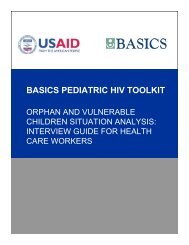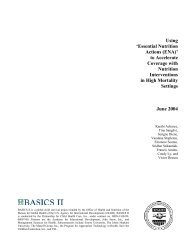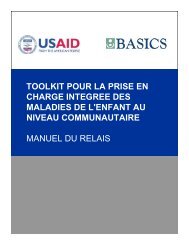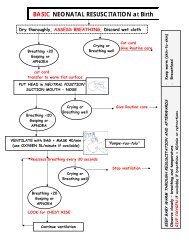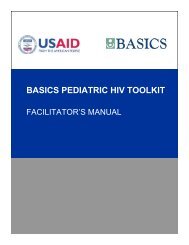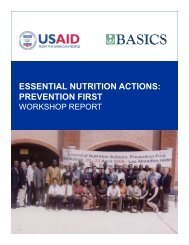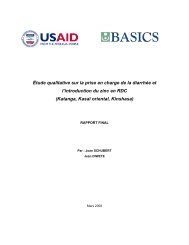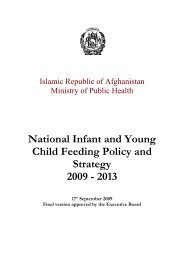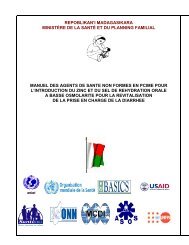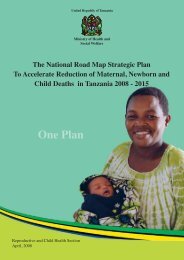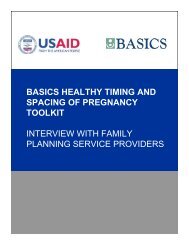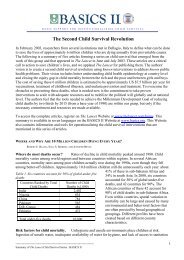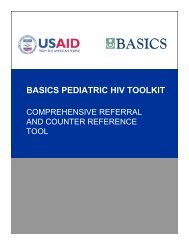Integrated Maternal and Newborn Care Basic Skills Course ...
Integrated Maternal and Newborn Care Basic Skills Course ...
Integrated Maternal and Newborn Care Basic Skills Course ...
You also want an ePaper? Increase the reach of your titles
YUMPU automatically turns print PDFs into web optimized ePapers that Google loves.
Reference Manual<br />
Malaria<br />
Susceptibility to malaria parasitemia is increased during<br />
pregnancy, particularly in the primigravida or women in their<br />
first malaria-exposed pregnancy. Malaria in pregnancy can<br />
cause severe anemia, provoke an abortion, premature birth,<br />
or the birth of a stillborn. Because placental sequestration of<br />
malarial parasites can occur, newborns of women who have<br />
suffered from malaria during pregnancy tend to be smaller,<br />
weaker, <strong>and</strong> more vulnerable to infections.<br />
Urinary Tract Infections<br />
Urinary tract infections (UTI) during pregnancy increase the risk of low birth weight infants <strong>and</strong><br />
prematurity . Neonatal problems that are associated with UTI include sepsis <strong>and</strong> pneumonia.<br />
The risk of urinary tract infection on adverse perinatal outcomes is greatest among those with<br />
the most severe infection of the kidney, known as pyelonephritis.<br />
Syphilis<br />
Untreated maternal syphilis increases the risk of spontaneous abortion, stillbirth, congenital<br />
infection in the newborn, <strong>and</strong> neonatal mortality. Early detection <strong>and</strong> treatment is necessary to<br />
halt the devastating effects of progressive syphilis in the woman <strong>and</strong> to prevent transmission to<br />
her baby <strong>and</strong> her partner. The test for syphilis should be repeated in the third trimester if the<br />
woman or her partner engages in risky sexual behavior.<br />
HIV<br />
Infection with HIV affects many aspects of antenatal care. A woman infected with HIV requires<br />
additional care to keep her as healthy as possible, to prevent transmission to her baby <strong>and</strong> her<br />
partner, to treat her HIV infection, <strong>and</strong> to link her to appropriate support <strong>and</strong> help her make<br />
decisions about the future, including avoiding unintended pregnancies. The risk of mother-tochild<br />
transmission (MTCT) of HIV is 15-45 percent; more than 90 percent of pediatric AIDS<br />
cases are due to MTCT. Untreated maternal HIV can also result in increased incidence of<br />
stillbirths <strong>and</strong> newborn deaths, low birth weight, intrauterine growth retardation, <strong>and</strong> possibly<br />
spontaneous abortion <strong>and</strong> preterm birth.<br />
Diabetes<br />
Uncontrolled diabetes during pregnancy can result in maternal morbidity <strong>and</strong> mortality <strong>and</strong> is<br />
associated with an increase in perinatal/neonatal mortality. In addition, certain fetal anomalies<br />
are more common in babies of diabetic mothers, <strong>and</strong> the larger size of babies born to diabetic<br />
mothers may contribute to cephalopelvic disproportion, obstructed labor, <strong>and</strong> increased<br />
occurrence of birth asphyxia <strong>and</strong> birth trauma. Finally, the baby of a diabetic mother is also at<br />
increased risk for hypoglycemia, which may occur in the immediate postpartum period, <strong>and</strong> for<br />
jaundice, which may develop during the early neonatal period.<br />
<strong>Integrated</strong> maternal <strong>and</strong> newborn care<br />
<strong>Basic</strong> skills course<br />
31



